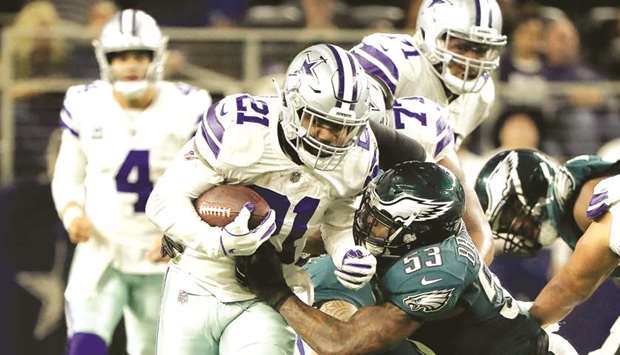The NFL has a rulebook, which you can read for fun, but just don’t bother applying it to an actual NFL game.
Despite the league’s best intentions to outline what is and is not a penalty, and making a violent game “safe,” all infractions are not the same. With increasing regularity, nothing a ref calls makes any sense.
Starting with the first play of the game, the Cowboys’ 29-23 overtime win over the Philadelphia Eagles on Sunday featured some of the most bewildering officiating from any game this season. I asked Cowboys running back Ezekiel Elliott if the players are frustrated with the “pattern” of calls this season.
“I think a little bit but what we do here is focus on what we can control. We can’t control what the refs do,” Zeke said.
“We’ve just got to do our best if we’re penalised, we recover take that penalty and try to make the best of it. We did a great job recovering from penalties we have, especially late in the game.”
With 11:32 remaining in the game, Zeke drew a 15-yard penalty for lowering his head and initiating contact to erase a 14-yard catch and run. He became the first offensive player to be penalised for such an infraction this season.
“I mean when you’re on that sideline, I got to protect myself,” Zeke said. “And if a guy’s going low, I got to go low too. The rule is meant for the betterment of the game. The rule is for our safety and if there was illegal helmet-to-helmet contact on there, that’s something I need to go look at and work on. That’s not OK. It’s just a tough play.”
Official Clete Blakeman told a pool reporter after the game, “It applies to both offense and defense. The ruling was basically he lowered his head and initiated the contact against the defender with the helmet as it’s defined in the rulebook. ... We feel good about the call. A couple of us had it as the same foul from different angles.”
No disagreeing that, by definition, Zeke’s play was a penalty. No argument that implementing such a rule will eventually force offensive players to simply keep their head up, thereby reducing the risk of injury.
The argument is that sort of hit is routine in an NFL game.
Speaking of tough plays and questionable calls, the Eagles began the game with one when Cowboys returner Jourdan Lewis clearly lost a fumble that the Eagles recovered on the opening kickoff. The ruling was that there was not a clear recovery.
“I knew I was down so I was not worried about it,” Lewis said after the game.
Uh yeah ... not sure the Eagles agree with that, especially after replays show he lost the ball before his knee was down, and the Eagles came up with the ball.
Blakeman said of that call: “We’ve got to have clear evidence that there was a fumble, which we did. We confirmed there was a fumble in the replay review. The second component of it is was there a clear recovery. And that’s just what we couldn’t confirm with the angles we had ... so we had to stay with the ruling on the field.”
OK, moving on from that logic defying explanation, with 2:55 remaining in regulation, Eagles tight end Dallas Goedert caught a pass and turned it into a 75-yard touchdown.
The play was overturned when officials called him for offensive pass interference that was questionable, at best. And by questionable I mean, horrendous.
On the next play, Cowboys defensive end Randy Gregory was penalised for a roughing the passer that appeared to be anything but. It was the second time in the fourth quarter Gregory was called for roughing the passer. All in all, the Cowboys were penalised 11 times for 111 yards. The Eagles were penalised five times for 49 yards.
Exactly how many of those combined 16 penalties were actual infractions, we may never know. You can read the rule book, but don’t expect those regulations to be anything other than selectively enforced.

Philadelphia Eagles Nigel Bradham tries to take down Cowboys running back Ezekiel Elliott during their NFl game on Sunday.
